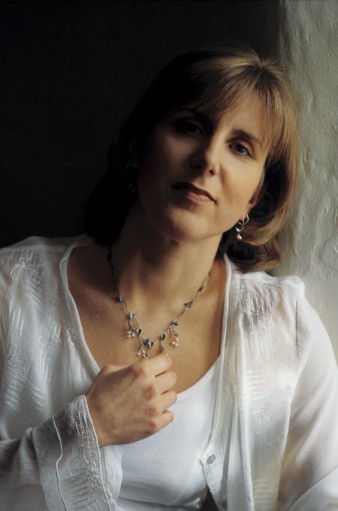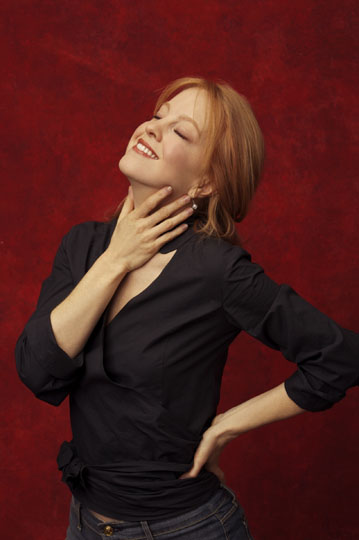Upshaw, Australian Chamber Orchestra, provide heartfelt advocacy for new song cycle

Dawn Upshaw gave the Chicago premiere of Maria Schneider's "Winter Morning Walks" with the Australian Chamber Orchestra Sunday at Symphony Center. Photo: Michael Wilson
Give the Australian Chamber Orchestra credit for daring. Staying away from the usual string ensemble chestnuts, artistic director Richard Tognetti led his colleagues in a bracing, venturesome program Sunday afternoon at Chicago’s Symphony Center that included a new song cycle performed by Dawn Upshaw
One of our most consistently enterprising advocates of new music, the American soprano presented Winter Morning Walks, a cycle of nine songs by Maria Schneider, written in 2011.
Schneider is best known as a jazz composer and arranger. In these songs, she has added three of her regular collaborators—-pianist Frank Kimbrough, clarinetist Scott Robinson and bass Jay Anderson—to the ACO string players to add an improvisational element. Upshaw is encouraged in these songs to vary the rhythms with each performance and, says Schneider, “to move or wait in accordance with what she is hearing and feeling around her.”
While the spontaneous element wasn’t always that apparent Sunday, Winter Morning Walks proved an attractive, well-crafted work and a superb vehicle for Upshaw’s refined artistry.

Maria Schneider
Set to nine poems by Ted Kooser, the gentle, reflections on nature are painted with music that is largely pastoral and ruminative. There is a clear pop sensibility in the open lyricism and unapologetic tonal style of Schneider’s songs. Yet, even with these modest forces, some of the more impassioned moments are over-scored and at times overwhelmed Upshaw’s slender voice.
Still, the best of these settings—“Walking by Flashlight” and “My Wife and I Walk the Cold Road”—are undeniably lovely songs, and in their homespun Midwestern simplicity fit Upshaw’s artistry like a glove. With her crystal-clear diction and youthful timbre, the Park Forest native provided luminous advocacy, singing with a heartfelt intimacy and a grain of melancholy that illuminated the settings’ gently varied expression.
Nine songs is a bit of a haul and Schneider may want to consider excising one or two settings and lightening the scoring for a tighter, more effective impact. Yet this is honest, melodic music that those in attendance clearly responded to, and is sure to find a wider audience in the forthcoming recording (Sunday’s Chicago performance was taped). The composer joined Upshaw and colleagues on stage to join in the warm applause.
The Schneider songs were prefaced by a unique presentation of Webern’s Five Pieces for Strings, Op. 5, and George Crumb’s Black Angels with both works performed side by side in alternating movements. The youthful ACO is clearly a fiery precision instrument and brought a widely terraced dynamic range and startling intensity to this demanding music.
Upshaw returned after intermission to perform three German songs (Schumann’s Mondnacht and Schubert’s Geheimes and Der Tod und das Mädchen) in string arrangements by Tognetti and Brahms, all rendered with affecting expression and drama as required.
As artistic director and ACO first violinist, Tognetti has clearly been intent on broadening the repertoire for his conductorless string ensemble. The concert closed with Tognetti’s own arrangement of Grieg’s String Quartet in G minor.
This is dark and turbulent music—the marking “agitato” appears in three of the four movements—and Sunday’s impassioned, full-metal performance by the young players of the ACO was riveting. Rather than just the usual doubling and tripling of the quartet’s four lines, Tognetti’s artful arrangement varies the voices with great skill, often shearing the textures down to one solo player to fine effect.
Upshaw was the headliner and Schneider’s new song cycle the main draw, but the tonal refinement and high-wire intensity demonstrated by Tognetti and his 16 colleagues also revealed the ACO as one of today’s finest chamber orchestras.
Posted Jun 12, 2012 at 9:42 am by Clara McCall
I was at Chicago’s Symphony Center when Dawn Upshaw gave the Chicago premiere of Maria Schneider’s “Winter Morning Walks” with the Australian Chamber Orchestra. I am eagerly awaiting the release of the forthcoming recording (Sunday’s Chicago performance was taped). Do you have an estimated release date?